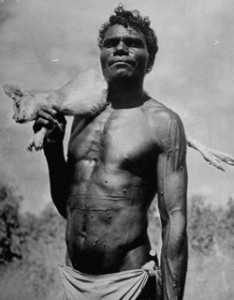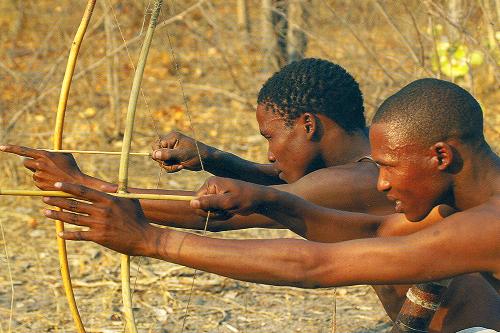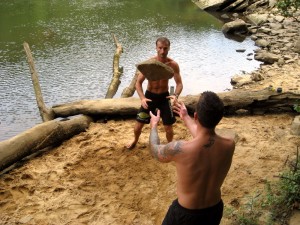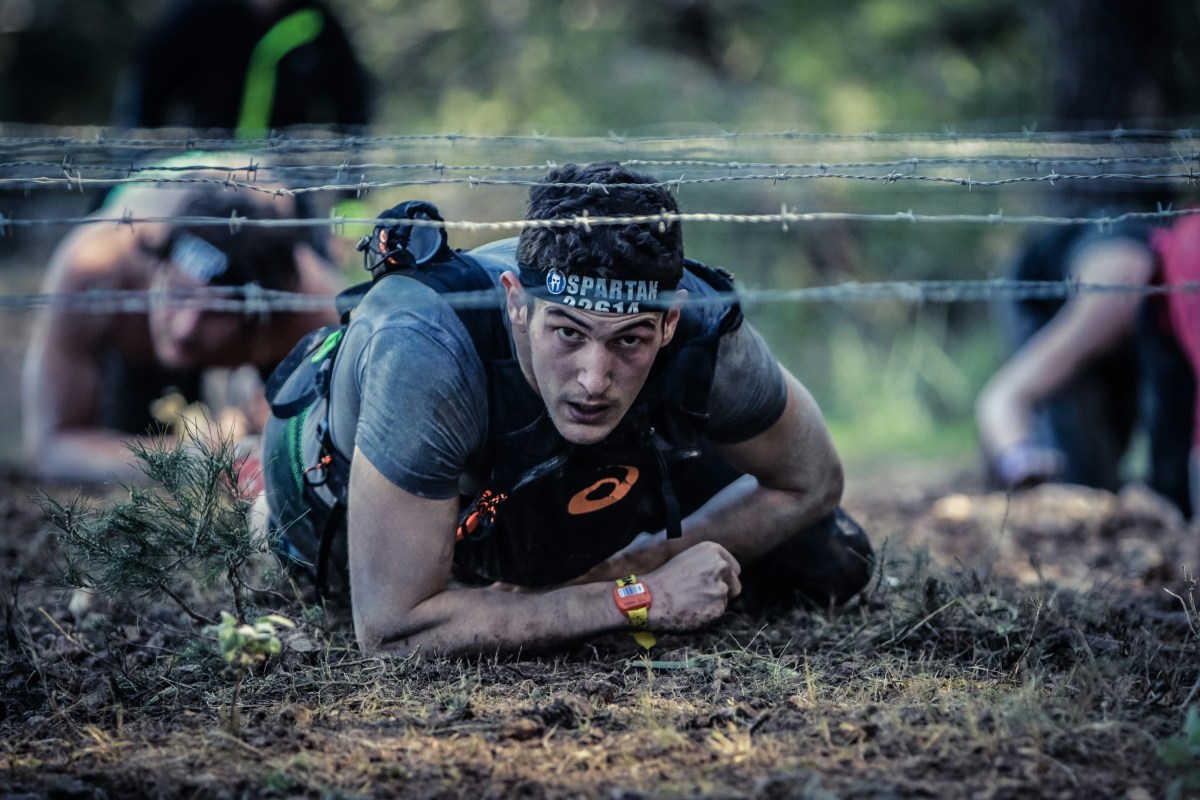How to get Healthy? The Stone Age Way
An Australian Aborigine Hunter Gatherer

Introduction
Modern humans have lived on this planet for around 200,000 years, and for 99% of that time, we lived exclusively as hunter gatherers, a highly active and mobile lifestyle which involved harvesting animal and plant foods that occurred naturally in a given area. When supplies dwindled or the weather changed, the people would move to another area. It was only 10,000 years ago in an area known as the Fertile Crescent in the Middle East that humanity adopted agriculture. Undoubtedly, farming has given us many benefits, it allowed an increasing population to settle permanently in one area, because we could now produce food rather than forage for it. Without agriculture, the building of complex civilisations and huge metropolis like settlements would have been totally impossible. It allowed technologies, the arts and culture to flourish like never before. However, 10,000 years is not a particularly long time in the course of evolution, therefore our bodies and brains are still struggling to adapt to the lifestyle of societies dependent on agriculture and industry.
We are consequently maladapted for the current modern lifestyles that most of us lead. Indeed, there are even so called 'Diseases of Civilisation or Affluence' which appear to confirm this fact, they are: coronary heart disease, obesity, cancer, diabetes, alzheimer's, dementia, depression, chronic stress, anxiety and ADHD etc. These diseases all serve to degrade both the body and mind in a needless fashion, as well as significantly reducing our life expectancy and sense of well being.However, there is a positive side to this, because with insight into how our ancestors lived. We can then choose appropriate elements of their lifestyle, our natural lifestyle to improve our quality of life.

An Adventurous Lifestyle
A hunter gatherers typical lifestyle is what some may call adventurous, a series of small and large challenges, positive and negative, with the main common factor being that these challenges tend to be unpredictable, short in time and diverse in type and intensity. In contrast modern societies subscribe to a highly regulated, predictable lifestyle. The tasks and duties we perform each day are constant, uniform and rule bound. Of course certain hunter gatherer challenges can be very stressful, such as running away from an enraged wild animal, falling from a tree or crossing an icy river. But this sort of stress is usually short in duration and is usually followed by a pleasurable sense of relief, knowing that the challenge is done and dusted. In contrast modern life is typically filled with chronic stress of low intensity but of long duration lasting weeks, possibly years. Examples of this include waiting for a report, preparing a PhD thesis, or enduring the daily grind of traffic jams. All of these things produce high levels of the stress hormone, cortisol, which contributes to the breakdown of muscles, it also suppresses the immune system and encourages obesity, anxiety and depression.
In modern life, we tend to approach challenges by formulating far off goals, compiling detailed plans to reach them and implementing rigid discipline in order to keep on track, this is fine, but it does lead to constant worrying about whether you are doing the right thing.
Hunter gatherers on the other hand cannot rely on complex and rigid planning, as it is impossible to predict where or when a significant opportunity to obtain food will present itself or a danger might strike. Consequently this leads to a rather more spontaneous, opportunistic style of solving problems, which present opportunities for features such as intuition, improvisation, exploration, adaptation and play to display themselves.
The hunter gatherer lifestyle of playfulness and spontaneity is the one that our brains and bodies are selected for by nature, applying this lifestyle helps to stimulate the body and brain to develop themselves for optimal performance. By sticking to unflinching rules and duties, we are more likely to suffer from chronic, long term stress and the other health problems associated with it. Below I am going to list a number of different recommendations of life style changes that you could implement in order to achieve the health and well being of our hunter gatherer ancestors.
An Example of a Paleolithic or Stone Age Meal

- The Paleo Diet | Lose Weight and Get Healthy by Eating the Food You Were Designed to Eat :: Dr. Lore
The Paleo Diet is a way of eating that best mimics diets of our hunter-gatherer ancestors - lean meats, seafood, vegetables, fruits, and nuts – by eating what we are genetically adapted to eat.
A Happier and Healthier Life
- Eat plenty of the foods that hunter gatherers ate: This includes meat, fish, vegetables, fruit, nuts and eggs, preferably from natural or organic sources if possible. All of these contain high concentrations of proteins, fats, vitamins, antioxidants, minerals and fibres, as well as small amounts of carbohydrates. You shouldn't have to worry about counting calories, as these sorts of foods should make you feel satiated quickly and build muscle and reduce fat in conjunction with exercise.
- Avoid the foods that hunter gatherers did not eat: So that's any sort of grain based products such as bread, rice, corn, cereal and pasta. Also avoid sugars, any dairy based products, most vegetable oils and any highly processed foods with lots of additives such as biscuits/cookies, doughnuts, sweets or hamburgers. These foods do contain a lot of calories, but very little nutrients and often plenty of 'anti nutrients' which are substances that tend to interfere with and change your metabolism. Be on the lookout for foods that have a high 'glycemic load', they contain lots of easily digestible carbohydrates that are quickly converted to high levels of glucose in the blood. This subsequently leads to the release of insulin which promotes the storage of glucose as fat. A more chronic activation of this process produces the 'metabolic syndrome' which is the precursor of many conditions such as coronary heart disease, obesity, diabetes, cancer, chronic inflammation and alzheimer's.
- Skip meals on occasion: Hunter Gatherers probably did not eat three square meals at fixed times every day. They sometimes went hungry for a day or more, and then compensated by feasting with a big meal, perhaps after a big hunt for example. This practice is termed 'intermittent fasting' and usually does not result in a reduction in the total amount of calories consumed. It has also been shown to fundamentally improve a variety of health factors such as cholesterol and glucose levels, as well as combating obesity.
- Move around regularly: Perform lots of low intensity tasks such as walking, cycling or swimming, whilst getting plenty of rest. Also perform regular medium level activities and periodic levels of high intensity activities such as sprinting, jumping and lifting heavy weights. Avoid repetitive high endurance training activities such as jogging or power training, as they can break down rather than build up muscles in the long run. Body-builders, for example achieve their physique mostly by pumping themselves with steroids. Going for jogs can be highly repetitive, boring and can be difficult to sustain as you get older.
- Introduce variation into your exercises: Try to take inspiration from the kind of movements that hunter gatherers perform, or better still children. Think about climbing, throwing, balancing, jumping, crawling, lifting, carrying and wrestling. Instead of using exercise machines that only allow for a single type of movement, use a variety of objects, such as: stones, chairs and tree trunks etc to lift, push and pull. These forces help to co-ordinate the body and brain, allowing you to be better prepared for something unexpected, thus increasing your sense of self control.
- Spend time in nature: We are part of the natural world, so we should all try to spend as much time in it as possible. This can be in the form of exercising and relaxing. If your life does not allow for that, then try and change your environment, put plants in your office or stick up a poster of a forest landscape. Recent studies have shown that all humans have an inborn attraction to nature called 'biophilia' and by spending regular time in the natural world, it can increase our mental health, happiness and recovery from illness.
- Catch regular sunlight: As with many things in life, doing things to an excess can be harmful, and spending too much time in the sun, as we all know can be extremely harmful. But catching it in regular bouts helps our skin to produce vitamin D, which according to recent studies plays a vital role in supporting the immune system, preventing cancer and building strong bones. A lack of sunlight is one of the primary causes of depression, particularly in winter, when sunlight is weaker. Subsequently the comparative lack of vitamin D and reduced immunity help explain why more people catch flu over the coldest and darkest months.
- Don't be afraid to expose your body to the elements: Try to walk or even run (if you're feeling confident) barefoot, using minimal clothing or supportive material. Take both hot and cold baths/showers or saunas, don't be afraid of stepping out in bad weather. The human body is not only made to withstand the elements, it can become stronger through regular exposure. Barefoot walking helps to strengthen muscles, tendons and general co-ordination, thus reducing the likelihood of developing flat feet, knee injuries and backache. Taking cold baths can also help boost the immune system, while saunas help promote the release of 'heat shock proteins' that protect and repair damaged cells in the body.
- Don't be afraid of dirt: We seem to have an incurable fixation with jygiene. We are constantly reminded to wash, clean, shower and disinfect. Granted, in places such as hospitals it's a very sound rule. But our immune system must learn to distinguish between different pathogens, so that they can fight them effectively. In order to achieve that, they must be exposed to a variety of micro-organisms. If this is not done in childhood, then you are more likely to suffer from allergies and other conditions. Amazingly most of the typical products that we use to maintain hygiene, may be doing us more harm than good. Things like soaps, shampoos, deodorants and antiseptics are full of irritants and potentially toxic chemicals. Common soil micro-organisms on the other hand, live symbiotically on our skin and in our bodies, they are crucial in protecting us from serious disease. Whenever humanity has suffered an epidemic, it has never spread through contact with dirt, rather through too many people living in too small a space.
- Explore and try out new things: Try to not allow yourself be governed by routines, plans, rules and expectations. Experiment with new challenges, explore new places, ideas and things in a playful, wholly spontaneous way. Take inspiration from children, as they are always willing to try something new, it ensures that you are constantly learning new skills and stimulating your mind, thus increasing your physical and mental capability. New challenges also help to combat boredom, depression and anxiety.
- Rest and relax: Both your body and mind need time to recover from exertions and repair damage. Don't work yourself into the ground, as you'll merely exhaust your reserves. Make sure you get a good nights sleep, play a relaxed game, chat to your friends or take a holiday to divert your mind. A good holiday can boost your energy and creativity, thus boosting your sense of well being in the short and long run.
- Keep your mind focused on the present: Try to stop yourself from thinking too much about the past or the future. Keep yourself in the here and now. Experience everything fully around you; savour the sights, sounds, smells and feelings that surround you. If you find that difficult, it might be worth engaging in some sort of meditation or yoga exercise to quieten and focus your mind.
An Example of a Paleolithic Exercise

Improving Your Life
By following these steps, hopefully in a short period of time; you'll notice that you have more energy, less stress, less fat, reduced levels of glucose, insulin, inflammation, a better physique, less illnesses, better co-ordination, more self confidence and stronger muscles. Basically you'll become significantly happier and healthier by adopting a diet and lifestyle which is closer to our hunter gatherer ancestors. However, implementing all of these steps at once can seem like a tall order. Therefore it's advisable to start slowly, making a few changes here and there, any step in the right direction can help improve your lifestyle.
Also be aware that your body may not be able to face up some of the most drastic changes, such as barefoot running and prolonged time in the sun or cold at first. But if you take it slow, make changes gradually, you'll notice that your body will eventually build up resistance.
A Khoisan Bushman Teaching his Son

The Next Generation
Looking after the next generation, our children, is probably the most important and vital thing that we do, and for hunter gatherers the importance was even greater, because they lived in small groups, numbering between 25 and 50. As well as taking steps to improving your own life, if you have children, then there are a number of ways to improve the lives of your children as well.
If you have small children, keep them in close physical contact with either their mother or another caregiver. This means lots of carrying, cuddling and breast-feeding, and also allowing them to sleep in the same as bed as you (or at least in the same room). But make sure you don't get too clingy, allow them to explore and play freely, so that they can learn about their world independently. This nurturing but permissive approach is how hunter gatherer's look after children.
Keeping babies out of sight of a carer, is very stressful and totally unheard of in a hunter gatherer society. A hunter gatherer baby cannot survive without the constant attention of others. On the other hand, keeping older children restricted and penned up suppresses their natural urge to explore, exercise and experiment; it also deprives them of their need to contact with nature, possibly imprinting on them that the world is a frightening place. Studies have shown that unstructured play in a natural setting is highly beneficial to children.
More Useful Websites
More Useful Books
© 2012 James Kenny










